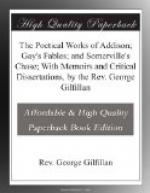His poetry is now in our readers’ hands, and should be read with a candid spirit. They will admire the elegance and gracefully-used learning of the “Epistle to Halifax.” They will not be astonished at the “Campaign,” but they will regard it with interest as the lever which first lifted Addison into his true place in society and letters. They will find much to please them in his verses to Dryden, Somers, King William, and his odes on St Cecilia’s Day; and they will pause with peculiar fondness over those delightful hymns, some of which they have sung or repeated from infancy, which they will find again able to “beat the heavenward flame,” and start the tender and pious tear, and which are of themselves sufficient to rank Addison high on the list of Christian poets.
[Footnote 1: Among these “others” was Abraham Stanyan, plenipotentiary extraordinary at Neufchatel at the settlement of the rival claims of the Duke of Brandenberg, Holland, and France, to that principality. He was afterwards ambassador to France. He married a daughter of Dr Pritchett, Bishop of Gloucester. It is said, that, having on one occasion borrowed a sum of money from Addison, the latter observed him to be very subservient, agreeing with every opinion Mr A. expressed, till Addison, provoked, and guessing the cause, said, “Stanyan, either contradict me, or pay me my money.” Our friend, Mr J. Stanyan Bigg, author of the very brilliant poem, “Night and the Soul,” is a descendant of Abraham Stanyan.]
ADDISON’S POETICAL WORKS.
POEMS ON SEVERAL OCCASIONS.
TO MR DRYDEN.
How long, great poet, shall thy sacred
lays
Provoke our wonder, and transcend our
praise?
Can neither injuries of time, nor age,
Damp thy poetic heat, and quench thy rage?
Not so thy Ovid in his exile wrote;
Grief chilled his breast, and checked
his rising thought;
Pensive and sad, his drooping Muse betrays
The Roman genius in its last decays.
Prevailing warmth has
still thy mind possess’d,
And second youth is kindled in thy breast;
10
Thou mak’st the beauties of the
Romans known,
And England boasts of riches not her own;
Thy lines have heightened Virgil’s
majesty,
And Horace wonders at himself in thee.
Thou teachest Persius to inform our isle
In smoother numbers, and a clearer style;
And Juvenal, instructed in thy page,
Edges his satire, and improves his rage.
Thy copy casts a fairer light on all,
And still outshines the bright original.
20
Now Ovid boasts the
advantage of thy song,
And tells his story in the British tongue;
Thy charming verse and fair translations
show
How thy own laurel first began to grow;
How wild Lycaon, changed by angry gods,
And frighted at himself, ran howling through




